Every industry has gone through a transformation, wherein they’ve adopted digital mechanisms. This shift is notable across the healthcare department too, where transformations conventionally have been gradual. This transformation in the healthcare sector can be seen in the way numerous players have adopted electronic health records (EHR) software(s) into their systems. Moving on from managing numerous records manually, digitization has helped healthcare institutions and individuals/patients significantly. From scheduling appointments to billing to reimbursement claims to post medical histories, EHR is playing a pivotal role in the way today’s healthcare landscape shapes up.
In this day and age, where physical space brings with its astronomical costs, cloud-based solutions have been gaining momentum. Similarly, a cloud based EHR solution is now seen as a cost-effective solution for maintaining all the records on a cloud server, rather than an internal one. Top cloud based EHR software(s) bring with it the freedom of customization and updates that are more than often taken care of by the provider.
While this transformation is being embraced with open arms, healthcare institutions and hospitals are finding it difficult to choose among the best cloud based EHR softwares for their organization. Though the software is aimed at easing out the processes, the decision to choose the one that matches their institution is a complex one. Owing to its capabilities, features and customization properties, healthcare institutions have their work cut out in choosing the right one.
To aid in the process of selection, we’ve gone through a few EHR software solutions and compiled a list of the best cloud based EHR softwares that we could find:
10 Best Cloud-based EHR Softwares of the Year 2020
1. athenahealth EHR Software
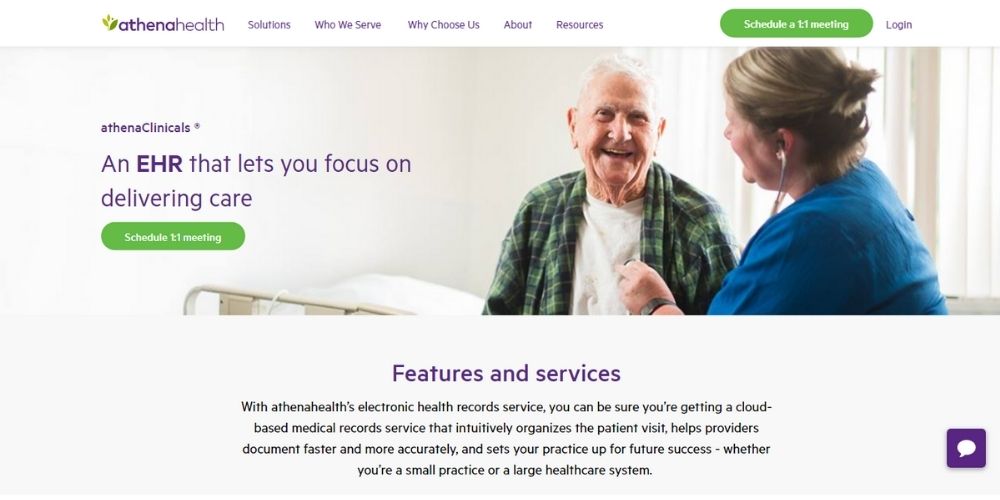
athenahealth is one of the best cloud based EHR softwares that manages numerous aspects that includes the likes of patient management, medical billing, revenue cycle management, population health management and care coordination. Being a top cloud based EHR software, athenahealth provides high quality assistance by undertaking quality and administrative services on the doctor’s behalf. On the other hand, patients can use the portal to pay their bills, schedule appointments, sign forms and to post their history.
Key Features
The key features of athenahealth under hospital management are:
- Appointment scheduling
- Claims management
- Inventory management
- Accounting integration
- Bed management
- Medical billing
- Policy management
- Physician management
Pricing
athenahealth offers numerous pricing plans, with the basic plans starting at $140 per month, per user.
Reviews Unplugged
Pros
- Provides a lot of learning and training modules to help the staff
- The software is versatile and can run on any OS
- Constantly innovates, through relevant updates
- Robust and effective reporting module
- The team is always open for feedback, with the feedback regularly implemented
Cons
- Clearance of claims isn’t a seamless process
- With too many features, there is a learning curve involved in getting used to the software
- The task assignment overrides (TAO) is complicated and takes some learning to understand
- The communication preferences need to be adjusted to reduce the number of notifications
2. DrChrono EHR Software
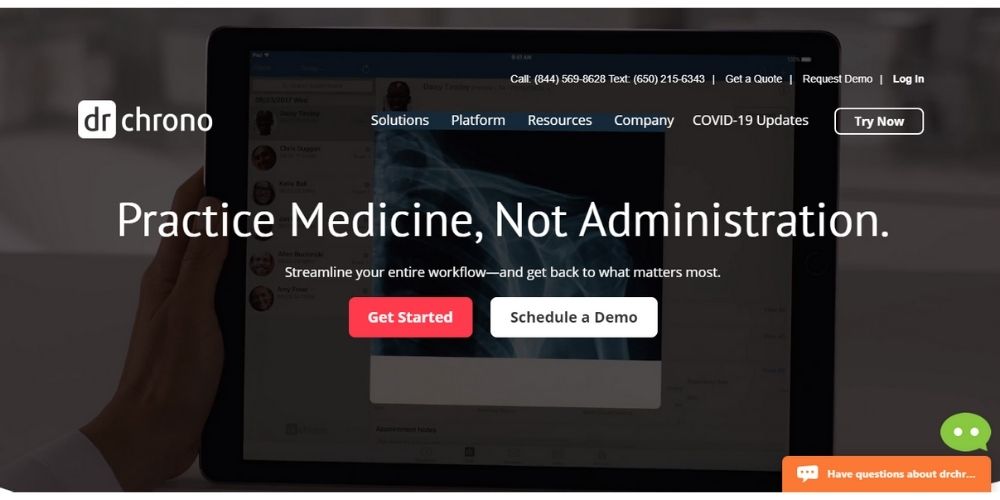
DrChrono’s EHR software is one of the most reliable and top cloud based HER software solutions for medical practices. Its revenue cycle management services and practice management software cater to institutions of all sizes. It is also the first organization to develop an EMR app for the iOS platform. It has also been the number 1 EMR for four years in a row according to Black Book Rankings’ survey. Thanks to its effectiveness, DrChrono is known for streamlining workflow and increasing operational and administrative efficiency.
Key Features
Being one of the best cloud based EHR softwares, DrChrono hosts numerous features that includes the likes of:
- Billing statement generation
- Customized content forms
- Direct messaging to physicians
- Reimbursement management
- Electronic remittance advice
- Profitability analysis
- Integrated billing
Pricing
DrChrono offers a free trial, with its plans starting from $99 per month.
Reviews Unplugged
Pros
- Clutter-free interface
- Batch refills and ordering of medication are easy
- Fast and reliable EHR software
- Offers numerous customizable templates
- Customer support is impeccable
Cons
- Mobile app integration is not up to the mark
- No option to change the check-in patient tab
- Price is increasing steadily every year
- Some functions aren’t as effective as advertised
3. Practice Fusion EHR Software
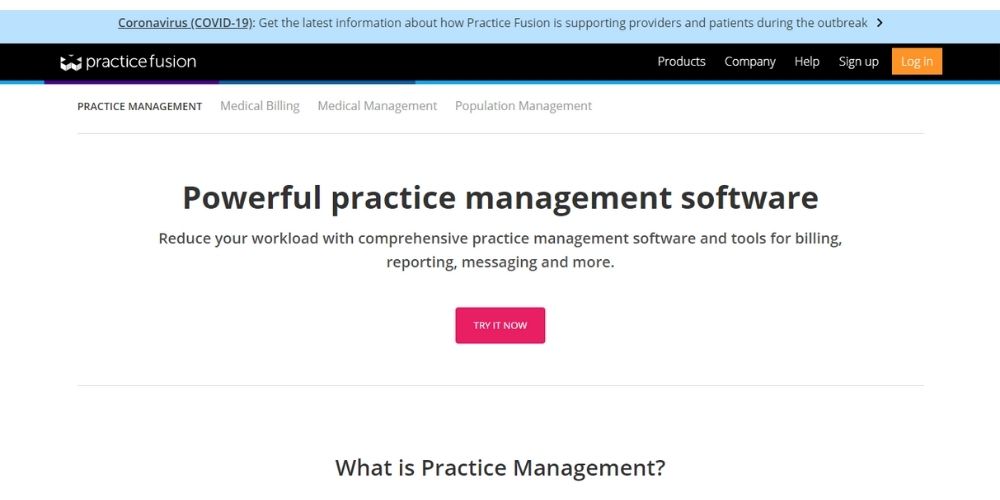
Practice Fusion’s EHR Software was launched with the singular purpose of improving the exchange of information between patients’ and doctors while increasing and improving efficiency of medical services. With a reputation of being the largest and one of the top cloud based EHR software present today, Practice Fusion has transformed the future of the healthcare industry by offering solutions that are not limited to the needs of patients and doctors, but also those of pharmacies, labs, imaging centres and other healthcare businesses. With a team of experts, Practice Fusion performs every function that you would expect from the best cloud based EHR softwares.
Key Features
Being one of the best in the industry, here are a list of the cloud based EHR software features that Practice Fusion offers:
- Appointment scheduling
- Compliance tracking
- Self-service portal
- Voice recognition
- E-prescribing
- ONC-ATCB Certified
Pricing
Practice Fusion offers a free trial, while its pricing starts at $99.00 per month, per user.
Reveiews Unplugged
Pros
- The software is easy to use
- The fax system coordinates with the software system allowing easy uploads of charts
- The software provides seamless and fast integration with labs
- Effective interface with numerous virtual products
- Turn around time for support is very quick
Cons
- Slow to add any new features or customizations
- Reaching customer support for any query is problematic
- Can be linked to only limited billing systems
- Lot of features are not optimized for mobile usage
4. AdvancedMD
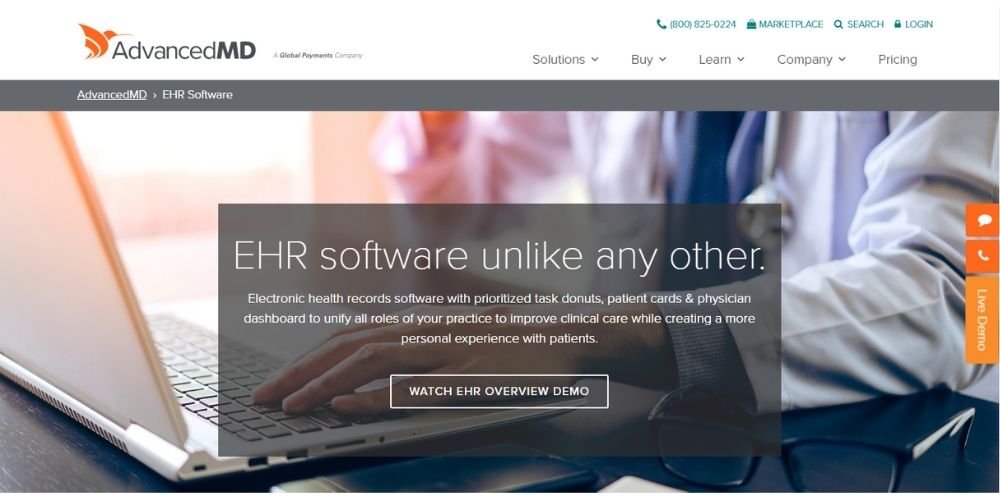
AdvancedMD is a top cloud based EHR software that is designed for physical therapy, mental health, healthcare organizations and physician practices. By automating the patient journey with integrated workflows, the software aims at improving the patient experience right from self-scheduling to telemedicine appointments. The platform also provides one of the highest levels of security, with its browser working across Windows and Mac operating systems and its mobile app for both iOS and Android platforms.
Key Features
Features of AdvancedMD include:
- Practice management
- Electronic health records
- Medical billing
- Patient engagement tools
- Telemedicine functionality
- Patient charts
- Reputation management
- Financial analytics
- Business intelligence reporting
Pricing
AdvancedMD offers multiple flexible plans with the basic plan starting from $169 per provider.
Reviews Unplugged
Pros
- Trustworthy service for billing, tracking claims, verifying insurance coverage among other things
- Customer service is very responsive and helpful
- The software is customizable
- Functionality and capability of the software are top notch
Cons
- No option to do automated write offs within the system
- No easy way to track the notes, other than searching them one by one
- Not as intuitive as expected
Certain necessary features demand an extra cost apart from the monthly cost one pays
5. prognoCIS
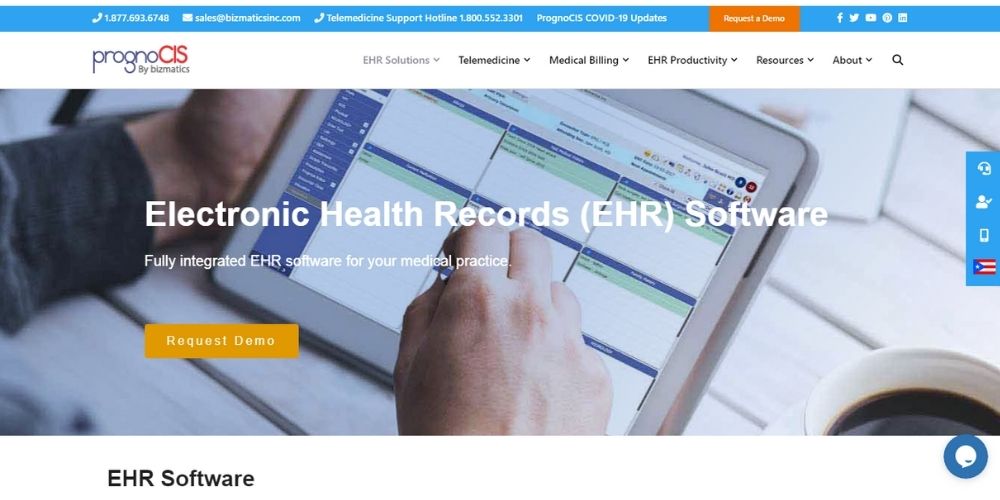
One of the best cloud based EHR softwares, PrognoCIS has the reputation of being a flexible and fast individual provider workflow that hosts a series of features. With features that are useful for both hospitals and private practices, PrognoCIS leads the charge across virtual medical encounters. The platform also hosts a dedicated portal for patients where they can communicate with the doctors securely, along with sharing lab test results, get prescription refills and set appointments.
Key Features
PrognoCIS has numerous features that include the likes of:
- Practice management
- Technical support
- Dedicated patient portal
- Medication management
- Revenue cycle management
- E-prescription
- HIPAA compliant
Pricing
PrognoCIS offers a free trial and their EMR plans start from $250 per month.
Reviews Unplugged
Pros
- Flexible software that can be optimized based on the functionality
- An adaptable software that provides multiple customizations
- Extremely user-friendly for small practices
Cons
- Too many clicks across different pages to perform a simple function
- Technical support is erratic
- More than often, tickets get closed without any resolutions
6. Kareo Clinical EHR
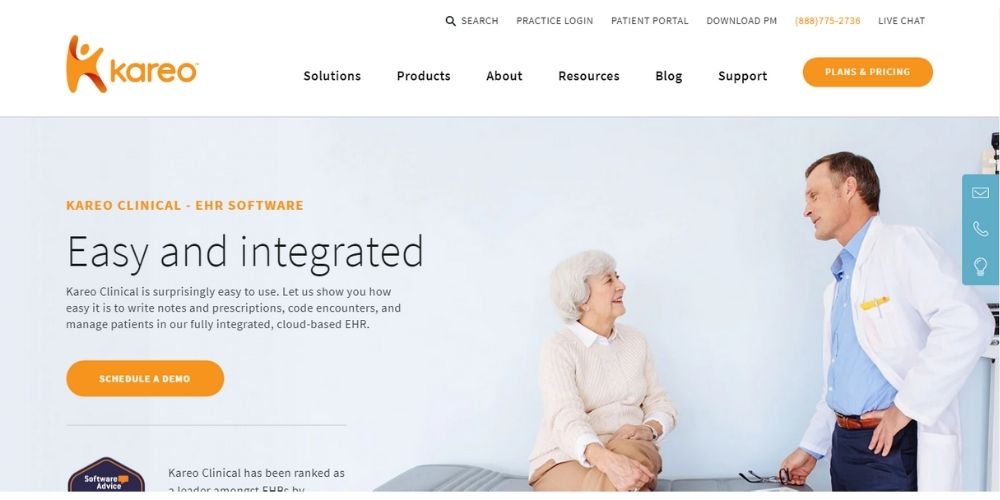
Kareo Clinical is one of the top cloud based EHR software which also has the reputation of being one of the most dependable electronic health records, revenue cycle management and practice management solutions in the market. Designed keeping in mind private practices, Kareo Clinical EHR is one of the best cloud based EHR softwares that is easy to use and customizable, with its comprehensive dashboard that allows integrated patient portal, electronic superbills, e-prescribing among others. The software is also user friendly, and seamlessly manages the workflow between the front and back offices.
Key Features
Kareo Clinic EHR has all the cloud based EHR software features that include:
- Comprehensive dashboard
- E-prescribing
- Patient portal
- Secure messaging
- Electronic superbills
- Flexible calendar
- Agenda overview
Pricing
Kareo Clinical HER has plans that start from $160 per month. They do not offer a free trial.
Reviews Unplugged
Pros
- User-friendly interface and easy to use even for people with little software experience
- Adaptable to a wide variety of documentation scenarios
- Very responsive customer care
Cons
- No auto save feature while creating progress notes
- No mechanism to transfer data in bulk. Must be done individually
- Infrequent and non-responsive when it comes to program updates
7. NextGen Office
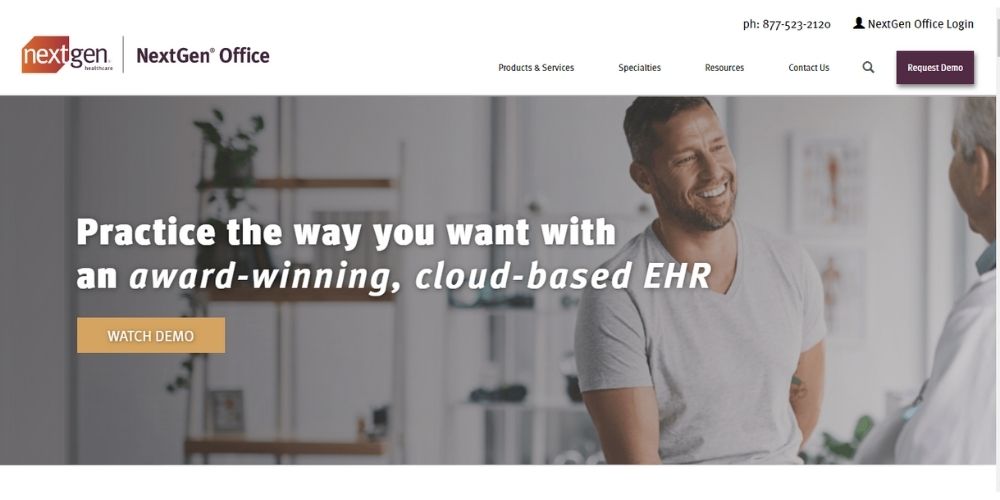
Founded with the goal to make medical office run more smoothly, NextGen Office is a top cloud based EHR software that is specially designed for private practices. The software allows users to touch, talk or type into the documentation directly. With all the bells and whistles of a top cloud based EHR software that include the likes of insurance eligibility, scheduling appointments and referral exchange features, NextGen Office is compatible with all the browsers along with following HIPAA compliance.
Key Features
Features of NextGen Office include:
- Appointment scheduling
- Handwriting recognition
- Voice recognition
- Self-service portal
- Compliance tracking
- ONC-ATCB Certified
Pricing
NextGen Office does not provide a free trial. The pricing plans for NextGen Office are available only on request.
Reviews Unplugged
Pros
- Easy to use software
- Saves a lot of administrative time
- Free webinars are conducted daily to understand different topics
- Customizable and flexible, the software offers good SQL performance
Cons
- Being one of the oldest in the market, some aspects are phased out in comparison with more complex systems
- Complaints and tickets are closed with a simple response on the mail. Sometimes this does not necessarily mean that the complaint is resolved
To get the best out of the software, expensive licensing and high maintenance PCs are required
8. ChiroTouch

Designed for small and midsized chiropractic practices, ChiroTouch combines electronic health records, patient scheduling, outcomes assessment, billing, inventory management, all in a single suite. Being one of the top cloud based EHR software, it also provides wireless support and lab integration on PC and also through the CTProvider app. The application of ChiroTouch also features claim scrubbing, automatic batch posting, eligibility inquiry among other options.
Key Features
Features of ChiroTouch include:
- Appointment management
- Billing & Invoicing
- Claims management
- Outcome assessments
- SOAP notes
- Patient records
Pricing
ChiroTouch does not offer a free trial, and its plans start at $259 per month.
Reviews Unplugged
Pros
- User-friendly interface, where one can learn how to navigate it easily
- Billing process in accounting is very well set up, with easy navigation
- The software offers customization with color coding, and different views of the schedule area
- Software updates are regular with minimal glitches
Cons
- Occasional hiccups with the support not being responsive
- No integration with QuickBooks
- Navigating through the reports section is cumbersome
- The software allows way too much room for human error
9. eClinicalWorks
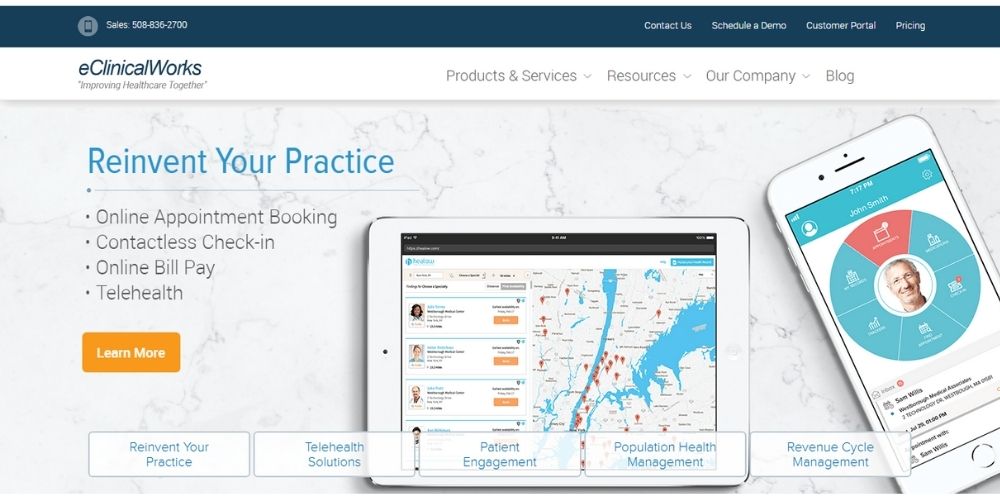
eClinicalWorks follows a structured suite where it provides technology in every stage of the patient care delivery process. Being one of the best cloud based EHR softwares, one can access features like customizable reminders healthcare analytics, patient engagement with the software. The software also allows for customizable documentation, structured data capture, trend analysis across different healthcare sectors. eCW’s Healow app also allows to tract patient’s data from their home monitoring devices, ensuring physicians can stay connected with their patients for activity, progress and other vital signs.
Key Features
With all cloud based EHR software features, eClinicalWorks’ list of features include:
- eClinicalWorks P2P
- Patients portal
- Referral management
- Registry reporting
- Meaningful use dashboard
- E-Prescribing
- Registry reporting
- Disaster recovery
- Billing implementation services
- Practice management
Pricing
eClinicalWorks does not offer a free trial, with its basic plan starting at $449 per month/provider.
Reviews Unplugged
Pros
- The search patient feature alerts you whenever there are two patients with the same name
- The chart documents are organised intuitively, so it is easy to find a specific document when in need
- Printing anything is smooth
- Setting-up is seamless
- Its features make it an all-comprehensive product
Cons
- The customer support is erratic, and most of the representatives do not speak English as their first language
- Some features require a lot of clicks to navigate
- Sometimes document viewing requires multiple log ins, multiple passwords
10. AllScripts Professional EHR
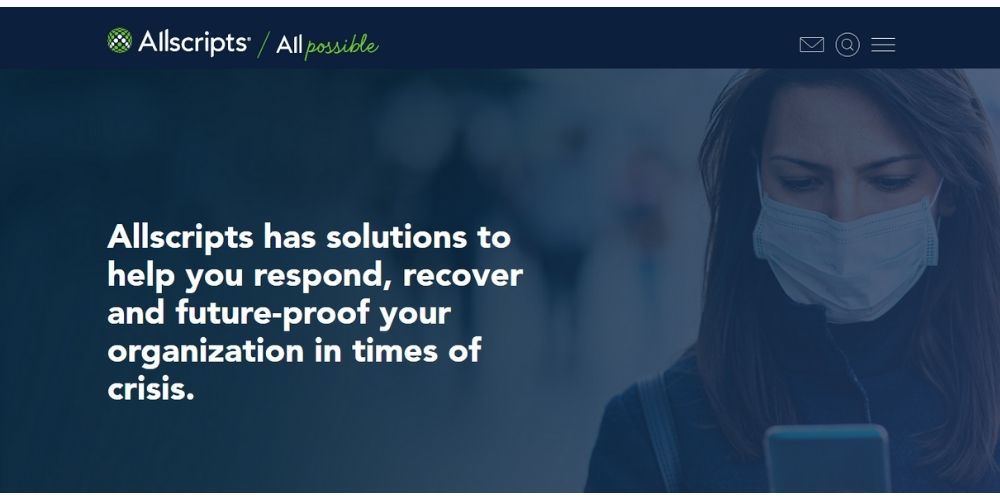
AllScripts Professional is a comprehensive software for large hospital practices. Being one of the best cloud based EHR softwares, it also manages aspects pertaining to revenue cycle right from eligibility verification to patient collection. These features allow practices to track, respond and monitor their operational and financial performance.
Key Features
AllScripts Professional comes with a wide range of features including:
- Appointment scheduling
- Compliance tracking
- Self-service portal
- E-Prescribing
- ONC-ATCB Certified
- Voice recognition
Pricing
AllScripts professional does not offer a free trial. For pricing details, one must contact the company directly.
Reviews Unplugged
Pros
- Simplifies the documentation process and works efficiently
- Easy to follow tasks under each patient
- Customizable dashboard based on one’s needs and preferences
- Reliable and easy to use system
Cons
- Not as user-friendly as others in the market
- The updates are glitchy
- Customer service is not efficient
- Every additional function is laden with extra costs
Frequently Asked Questions about Cloud Based EHR Software
What are the reasons to opt for Cloud-based EHR systems over In-house
EHR systems across the world have become indispensable in today’s day and age. These systems are broadly categorized as Cloud-based EHR systems or in-house EHR systems. Since the inception of EHR systems, practices have adopted the in-house systems wherein they store data in house, with a different server, hardware, and software solutions installed in the office. But, more and more practices are seeing the advantages of cloud-based EHR systems. Let us look at a few of the advantages:
Simpler implementation
Cloud-based EHR systems require just a stable internet connection and a computer to be up and running. With no hardware or software installation like the in-house EHR systems, medical practices can implement cloud-based systems with ease.
Higher savings
Cloud-based EHR systems are relatively pocket-friendly for medical practices. The installation costs are one of the biggest hurdles in implementing an EHR system, and the cloud-based system takes care of that facet. It relieves a practice of different installation, licensing, maintenance, updates, and security patches costs, which are all applicable in an in-house EHR system.
Requirement of IT resources
By using cloud-based EHR systems, medical practices need not invest in a well-equipped IT team to take care of the installation, configuration, testing, running, and updating the hardware and software. By having all of these on the cloud through a SaaS provider, updates and installations are done automatically without the IT team.
What is the difference: EHR vs EMR
EHR and EMR software(s) are used interchangeably by almost everyone. However, there are intricate differences between the two. Before we differentiate EHR and EMR software(s), let us look at each of them individually.
Electronic Medical Records(EHRs) or Electronic Medical Records(EMRs) are both digital versions of the different charts in a clinician’s office. The EMR contains the treatment and medical history of the patients. It also allows clinicians to track different patient data over time. It also helps them in identifying the patients that need preventive checkups or screenings. EHR also allows doctors and clinicians to check how their patients are doing, by monitoring different readings that include the likes of blood pressure, sugar levels, vaccinations among others. Owing to these facets, EMRs have improved the overall quality of care that is offered by various practices.
When we look at the EHR and EMR software(s) and their differences, EHRs or Electronic health records do all the things that EMRs do and a lot more. EHRs focus on the holistic health of the patient by going well beyond the standard clinical data that is collected. This helps clinicians gather a broader perspective on the patient and the care that is needed. EHRs also allow patient data to be shared among different designated entities like laboratories, clinics, insurance providers to have a complete outlook of the patient.
How much does an EHR Software cost?
Every medical practice that wants to implement an EHR software wants to know the EHR software cost in the market. The average EHR software cost can range anywhere between $15,000 to $70,000 per provider. This also depends on whether a practice chooses a cloud-based EHR system or an in-house EHR system. While the former has a fixed monthly subscription cost, the latter requires one to pay ongoing costs to manage and support the on-site servers. Moreover, practices must look at 5 other factors to get a clearer and more accurate idea of the EHR software cost. These are:
- Hardware that needs to be installed, and the costs incurred during the same.
- EHR software that is being deployed, and the ancillary costs that come with it. This could include additional modules, plugins, upgrades among other factors.
- Implementation assistance is required in the initial phases. Some processes need contractors, IT personnel, electricians, installation support staff among others.
- Training needed for the in-house staff to familiarize themselves with the processes. Nurses, office staff, administrative staff, physicians need to understand how the software can be used to their advantage, and training sessions are needed for the same.
- Maintenance fees: Every EHR software has potential ongoing costs that include the likes of telecom fees, IT support fees, maintenance agreements, licensing costs. These costs have to be accounted for while considering an EHR software cost.
What is a Chiropractic EHR software and what are its features?
Designed especially for chiropractors, the chiropractic EHR software is an integrated, specialized software solution that is equipped with the necessary workflows, tools, and processes to help relieve a patient from discomfort and pain. A chiropractic EHR software is designed specifically to handle the unique requirements and workflows of chiropractic clinics. They also provide the requisite features and templates that simplify the documentation, billing, and care delivery processes. The best chiropractic EHR software also helps their staff record different patient demographics, perform billing operations, manage reports and appointments, improving the workflow and efficiency of chiropractors.
A good chiropractic EHR software has numerous features that include the likes of:
- Referral Management
- E&M Coding Assistance
- Flexible charting styles
- Mobile App device access
- ICD-10 Compliant
- Scan in your charts or access a variety of them
- Single database for EHR and Practice Management
- Local professional implementation, support services, and training
What does an EHR software for behavioral health do?
In recent years, we have seen an integration between mental and physical health in every practice. This realization has also led to different care organizations in coming up with EHR software for behavioral health. Behavioral health has always had complex processes and distinctive requirements, and all these are handled with EHR software for behavioral health. These help patients and improve a practice’s efficiency in handling workflows by reducing the amount of time one dedicates to redundant and repetitive tasks. The EHR software for behavioral health relieves a clinician from tasks related to billing, scheduling, and documentation. The specialty specific nature of the EHR software for behavioral health is bound to help practitioners in providing patients with personalized care to improve the outcomes.
What does an EHR software for mental health do?
In today’s world, while awareness towards mental health has increased, the implementation of technology that supports the diagnosis and betterment of mental health is still awaiting widespread usage. Similar to its effect on the health and well-being of patients and practitioners, implementing an EHR software for mental health can greatly help in bringing seamlessness into the field. EHR software for mental health can help physiatrists in feeding all the requisite details without having to worry about missing out on any details. This also reduces clinical errors and gives out detailed information of a patient which forms the foundation for giving out the right mental health diagnosis. The EHR software for medical health is different from the traditional EHR software in terms of the classifications, codes, medical language, regulations, and data reporting tools that are present. An EHR software for mental health is also subjected to elevated privacy regulations beyond the traditional HIPAA requirements.

